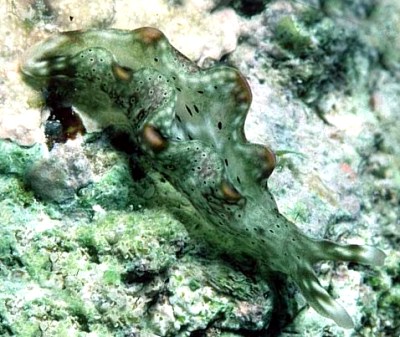
Elysia sp. 11
Order: SACOGLOSSA
Superfamily: ELYSIOIDEA
Family: Elysiidae
PHOTO
Pemba Island, Tanzania, February 1999. Photo: Bernard E. Picton.
Compare with Elysia trisinuata Baba 1949.
Authorship detailsRudman, W.B., 2001 (April 1) Elysia sp. 11 [In] Sea Slug Forum. Australian Museum, Sydney. Available from http://www.seaslugforum.net/find/elyssp11
Related messages
Unknown Elysia from Sodwana, Sth Africa
February 9, 2009
From: Valda Fraser
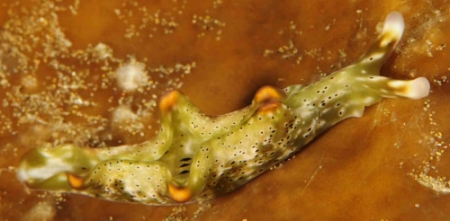
Dear Bill
None of the books I have include this critter. Please help.
Locality: Sodwana, 25 m, South Africa, Indian, 31 January 2009, Rocky reef. Length: 20 mm. Photographer: Valda Fraser.
Best wishes
Valda
valdafraser@mweb.co.za
Fraser, V.J., 2009 (Feb 9) Unknown Elysia from Sodwana, Sth Africa. [Message in] Sea Slug Forum. Australian Museum, Sydney. Available from http://www.seaslugforum.net/find/22226Dear Valda,
This is the unnamed species I am calling Elysia sp. 11 on the Forum
Best wishes,
Bill Rudman
Elysia sp. 11 from Mayotte
February 9, 2009
From: Sylvain Le Bris

Concerning message #3681:
Dear Bill,
Another picture of Elysia sp 11 (I guess) from another location in Southern Indian Ocean.
Locality: Jardin japonais, 20 m, Mayotte, Indian Ocean, 07 December 2008. Length: 1 cm. Photographer: Sylvain Le Bris.
Regards
Sylvain Le Bris
lebris.sylvain@gmail.com
Le Bris, S., 2009 (Feb 9) Elysia sp. 11 from Mayotte. [Message in] Sea Slug Forum. Australian Museum, Sydney. Available from http://www.seaslugforum.net/find/22113Dear Sylvain,
Yes this is Elysia sp. 11. An interesting point is that this specimen does not have the characteristic 3 notches along the edge of the parapodia, which are usually outlined in orange. It has the middle one, and traces of the posterior one but not the anterior one. I assume the absence is because of its juvenile size. It is a useful piece of information which will need to be taken into account when the species is being described and defined.
Best wishes,
Bill Rudman
Elysia sp 11 from Reunion
June 29, 2007
From: Hugues Flodrops
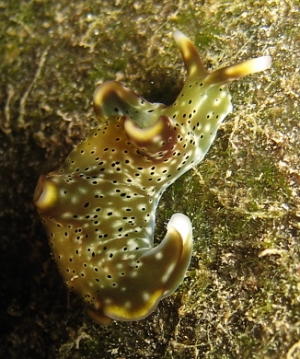
Hi Bill,
Here is a new Elysia from Reunion Island, Rocky coast Etang-Salé. It is similar to Elysia ornata but the submarginal orange band is missing. My best guess is Elysia sp 11 which I saw in the photo of Lindsay Warren (message #8191).
Locality: Etang-Salé (Rocky coast), 0,5 metre, Reunion Island, Indian Ocean, 15 february 2007, Evening. Length: 45 mm. Photographer: Hugues Flodrops.
What is your opinion?
Best regards.
Hugues
hugues.flodrops@wanadoo.fr
Flodrops, H., 2007 (Jun 29) Elysia sp 11 from Reunion. [Message in] Sea Slug Forum. Australian Museum, Sydney. Available from http://www.seaslugforum.net/find/19473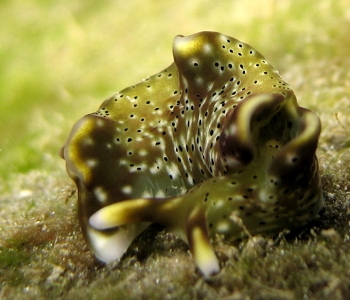
Dear Hugues,
Yes this is Elysia sp. 11.
Best wishes,
Bill Rudman
Elysia sp. 11 from Malaysia
February 6, 2007
From: Charles Rowe
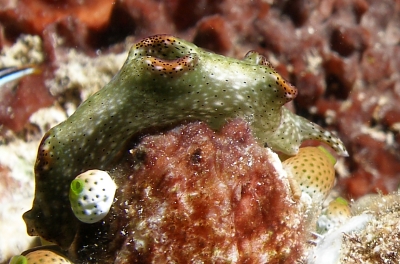
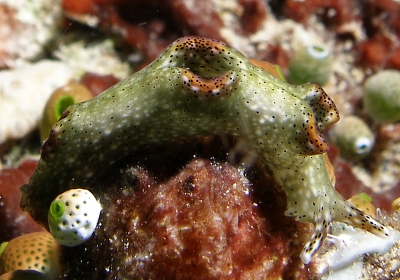
Hi Bill,
This nudi is from my trip to Sipadan in April. It was on a wall and very tough to spot. It looks unlike any other nudi I have seen. Can you identify it?
Locality: West Ridge, Sipadan Island, 15 metres, Malaysia, Ocean, 28 April 2006, On a wall. Photographer: Charles Rowe.
Charles Rowe.
bumff@mweb.co.za
Rowe, C., 2007 (Feb 6) Elysia sp. 11 from Malaysia. [Message in] Sea Slug Forum. Australian Museum, Sydney. Available from http://www.seaslugforum.net/find/18526
Dear Charles,
All I can say is that this is what I am callingElysia sp. 11 . It's possible that there is a name for this species but some Elysia descriptions are difficult to interpret.
Best wishes,
Bill Rudman
Elysia sp 11 from Cebu
May 22, 2006
From: Fabio Russo

Dear Bill,
I am returned from a beautiful trip in Moalboal, Cebu island!
I have taken a lot of shots of slugs! I think this may be Elysia sp 11, but I have same doubts. Can You help me in identification?
Locality: Dolphin house, Cebu island, 17 meters, Philippines, Pacific ocean, Tanon strait, 21 april 2006, Reef. Photographer: Fabio Russo.
Thanks a lot
Best wishes
Fabio Russo
scercola@alice.it
Russo, F., 2006 (May 22) Elysia sp 11 from Cebu. [Message in] Sea Slug Forum. Australian Museum, Sydney. Available from http://www.seaslugforum.net/find/16542Dear Fabio,
Yes this is Elysia sp. 11.
Best wishes,
Bill Rudman
Elysia sp. 11 from the Philippines
October 25, 2002
From: Erwin Koehler
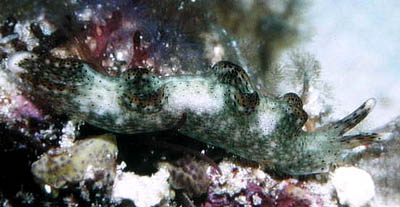
Dear Bill,
This shot is by Fred Vogt reticulata@gmx.net from the Philippines, Cebu Island, Moalboal, divesite "Look II". Length about 2 cm, depth 21 m, March 2000.
This animal looks like the one which Debelius calls Thuridilla sp. at page 170.
Erwin Köhler
Erwin@medslugs.de
Koehler, E., 2002 (Oct 25) Elysia sp. 11 from the Philippines. [Message in] Sea Slug Forum. Australian Museum, Sydney. Available from http://www.seaslugforum.net/find/4815Dear Erwin,
This is the species I am calling Elysia sp. 11
Best wishes,
Bill Rudman.
Elysia sp. 11 from Madagascar
October 17, 2002
From: Lindsay Warren

Dear Bill
I thought you might like to have these shots of Elysia sp. 11 from Madagascar. I found this specimen (LCRW0001) on the morning of 23 January 2002 at a depth of 20 ft on algae growing on the patch reef of Nosy Toloho, Iles Mitsio, NW Madagascar. L: 40 mm. It was preserved by freezing and then placed in alcohol and is now lodged with The Natural History Museum, London Reg. No. BMNH.20020521 should one of the Elysia experts wish to do the taxonomy on this species as there seem to be a number of specimens building up.
All the best
Lindsay
alldcl@compuserve.com
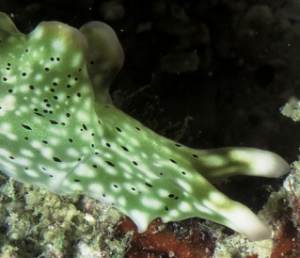
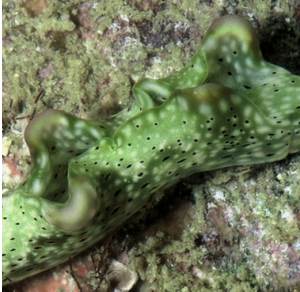
Thanks Lindsay,
Bill Rudman
Re: Elysia sp. 11 from Papua New Guinea
January 9, 2002
From: Kathe R. Jensen
Dear Bill and Mary Jane,
I have to agree with Bill suggestion that describing the Indo-Pacific species of Elysia requires more than one Ph.D. thesis - and more time than the usual 3-4 years. Even with the capability to read at least 4 languages and with access to a well equipped library (though the access is temporarily interrupted while I am in Thailand), I am afraid it has to be done little by little. However, now I have seen pictures of the Elysia sp. 11 from several localities, and it seems that this one species could be adequately described provided people would send about 5 properly preserved specimens to me. It can at least be compared with the species that already have names. Unfortunately editors do not like papers describing just one new species in a genus where everybody knows there are plenty more undescribed species, so it may be difficult to publish such a description.
Cheers,
Kathe
jensen@ait.ac.th
Jensen, K.R., 2002 (Jan 9) Re: Elysia sp. 11 from Papua New Guinea. [Message in] Sea Slug Forum. Australian Museum, Sydney. Available from http://www.seaslugforum.net/find/5921Thanks Kathe,
Bill Rudman
Elysia sp. 11 from Papua New Guinea
December 18, 2001
From: Mary Jane Adams

Hi Bill,
I found this Elysia sp. 11 on a divesite called "Lillian's Patch" in Bootless Bay, Papua New Guinea [October 2001]. From your website it appears that this slug lives all over the Indo-Pacific. Isn't it about time somebody gave the poor beast a proper name? With so many undescribed Elysia species it seems like a good subject for somebody's PhD project.
Length: 25 mm
Depth: 15 meters
Best regards,
Mary Jane
divepng@yahoo.com
Adams, M.J., 2001 (Dec 18) Elysia sp. 11 from Papua New Guinea. [Message in] Sea Slug Forum. Australian Museum, Sydney. Available from http://www.seaslugforum.net/find/5815Dear Mary Jane,
I think untangling the Elysias would keep an army of Ph D students occupied. It seems to me that this is a group where an understanding of their food and their reproductive strategy (direct development, planktotrophic larvae etc) as well as the normal colour and morphological characters, will be needed to make sense of the variety and similarity we find. And of course to check up all previous descritptions they will need a good library and the ability to read 5-6 languages.
Best wishes,
Bill Rudman
Elysia sp 11 from SE Sulawesi
June 1, 2001
From: Lindsay Warren
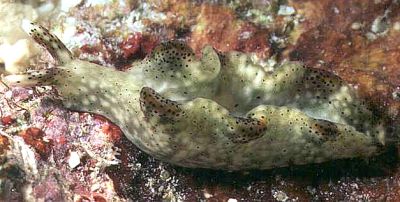
Dear Bill
I have been meaning to send you the attached photo of our OWN63 for some time and was interested to see Bernard Picton's photo of the same species on the Forum.
It was first found in the Tukang Besi Archipelago, SE Sulawesi, Indonesia [Operation Wallacea] by Dr Monica Sullivan on 29 October 1998 at a depth of 5.3 m on Pulau Hoga on filamentous algae. That one measured 8 mm. The specimen shown in the attached photo was found by Richard Smith on 15 June 1999 and measured 36 mm. Photo: Lindsay Warren.
It is quite distinctive in having very fleshy parapodia whereas Elysia ornata has very thin parapodia. There are also several differences in the colour markings and presumably in internal anatomy.
All the best
Lindsay
alldcl@compuserve.com
Warren, L., 2001 (Jun 1) Elysia sp 11 from SE Sulawesi. [Message in] Sea Slug Forum. Australian Museum, Sydney. Available from http://www.seaslugforum.net/find/4451Thanks Lindsay,
We seem to be no closer to a name but it certainly is a distinctive species,
Bill Rudman
Re: Elysia sp. 11
April 15, 2001
From: Kathe R. Jensen
Dear Bill,
This species also reminded me of a photo Clay Bryce sent to me a long time ago. Unfortunately I have not brought Clay's photos with me to Thailand, and I think he only had one specimen available, so not much to base a new species description on. However, if it occurs many other places, maybe it would be possible to collect enough specimens for a proper description. It is definitely not Elysia trisinuata, which is bright green with thin white papillae. The best slide I have of this species is one taken by Brian Darvell in Hong Kong in 1986 or maybe 1983, and I still cannot scan slides.
However, I would be happy to receive preserved specimens (formalin and then transferred to alcohol), if anyone happens to find more.
Greetings,
Kathe
jensen@ait.ac.th
Jensen, K.R., 2001 (Apr 15) Re: Elysia sp. 11. [Message in] Sea Slug Forum. Australian Museum, Sydney. Available from http://www.seaslugforum.net/find/4184Thanks Kathe,
Bill Rudman
Re: Elysia sp. 11
April 15, 2001
From: Cynthia D. Trowbridge
Dear Bill,
In September 2000, I sent photographs by Yoshi Hirano to the Forum of Elysia trisinuata. The white papillae are minute (as you can see from Yoshi's photos) but they are still readily apparent. The colouration of the Elysia sp. 11 looks much different from E. trisinuata in Japan or in Taiwan. All the specimens that I have seen of E. trisinuata are very massive or thick, not delicate or "svelt" like most other Elysia species. Also, parapodia thickenings are quite visible in Elysia sp. 11 but not in E. trisinuata. Good luck with finding a name but I do not think it is E. trisinuata, despite the way Elusia sp. 11 is holding its parapodia.
All the best,
Cordially,
Cynthia
trowbric@ucs.orst.edu
Trowbridge, C.D., 2001 (Apr 15) Re: Elysia sp. 11. [Message in] Sea Slug Forum. Australian Museum, Sydney. Available from http://www.seaslugforum.net/find/4185Dear Cynthia,
Don't worry, I wasn't trying to 'squeeze' Elysia sp. 11 into E. trisinuata and my apologies for not including a link to the Elysia trisinuata Page and Yoshi's helpful photos. It will be great when we have easily available photos of all the named sacoglossans, as the subtleties in shape and colour are very difficult to record in words and black and white drawings.
Best wishes,
Bill Rudman
Re: Elysia sp. 11
April 12, 2001
From: Mary Jane Adams
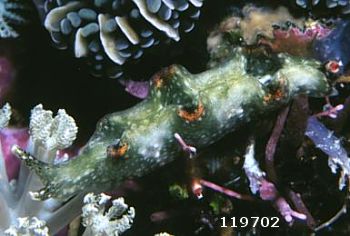
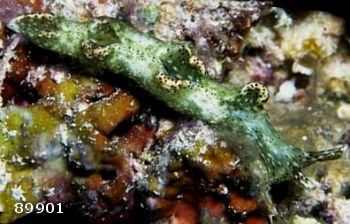
Hi Bill,
I found a couple of pictures in my files that look like Bernard Picton's Elysia sp. 11. I found the first one (119702) in the Florida Group of the Solomon Islands in November, 1997. It was 21 mm long, depth not recorded. I photographed the second one (89901)in Tonga in August, 1999. It was also 21 mm long and five meters deep. Whatever it is, it seems to have quite a wide distribution.
Best regards,
Mary Jane
divepng@yahoo.com
Adams, M.J., 2001 (Apr 12) Re: Elysia sp. 11. [Message in] Sea Slug Forum. Australian Museum, Sydney. Available from http://www.seaslugforum.net/find/4117Thanks Mary Jane,
It certainly has a fairly distinctive shape and colour. It reminds me of Elysia trisinuata Baba 1949, from Japan, but that species was said by Baba in the original description to have papillae on the parapodia and rhinophores. In a later description (Abe, 1964) the papillae are not visible in the illustration and in the text are said to be 'minute'.
Perhaps someone familiar with the Japanese fauna can help us out.
Best wishes,
Bill Rudman
Elysia from Pemba Island, Tanzania
April 3, 2001
From: Bernard Picton

Hi Bill,
Here is an Elysia from Pemba Island, Tanzania (Feb 1999). It is similar to Elysia ornata but lacks the black lines along the parapodia and white spots on the body. It also has conspicuous orange patches on the highest parts of the lobed parapodia and a white and green marbled pattern on the rhinophores and tail, also present but less pronounced on the parapodia. Debelius illustrates a similar animal from Bali on page 170 as Thuridilla sp. (though his has black spotting on the rhinophores and parapodial lobes).
Bernard
bernard.picton.um@nics.gov.uk
Picton, B., 2001 (Apr 3) Elysia from Pemba Island, Tanzania. [Message in] Sea Slug Forum. Australian Museum, Sydney. Available from http://www.seaslugforum.net/find/3681Dear Bernard,
The colour pattern is quite distinctive but I can't find a reference to anything similar in the literature.
I am giving it a 'home' as Elysia sp. 11 until I get some better advice.
Best wishes,
Bill Rudman
